Morocco – High Atlas Mountains
Jan 17th, 2014 by willmarks
A four hour early morning drive from Essaouira left us at our trailhead at Aguerssioual village in the Azzaden Valley, where we briefly took in some tea and cookies before heading up the High Atlas Mountains. With Mohamed at the wheel as usual, we had picked up our young guide, Jemal, outside of Marrakech.
For the nine of us, the full team included Jemal, 3 mules to haul clothing/sleeping bags, one human caretaker per mule, and 2 cooks and their 2 mules.
Our climb commenced, and after about an hour we caught up with the cooks, who had started earlier and who had prepared a gourmet salad, rice, and meatballs. As is the norm, we began with tea, all of us relaxed on a blanket in the sky.
The hike continued up and up and then a descent. After starting the day at 1,650 meters, here we are a few hours later at our highest point of the day, Tizi Oudid (2,200 meters), and then on our way down to where we would spend the night.
We covered 25+ kilometers over the two days, roughly split evenly. The mules were there for our use as well; Maggie took a couple of rides but she and all of the kids were troopers and were on their feet with few exceptions.
After walking through Mattat village, we arrived at our destination, Tizi Oussem village (1,760 meters). Toby and Max after the long walk…
Tizi Oussem can be characterized as a “Berber village”. The Berbers have been in Morocco for at least 5,000 years, much longer than the Arabs, who didn’t show up until the 7th century. Most of the approximately 35 million Moroccans have both Arab and Berber ancestors, particularly in the cities. In the Atlas Mountains, we are told that more pure Berbers remain, and apparently they are not always kind to the Arabs who, in a sense, forced them into the mountains. A guide who joined us later on our trip, Driss, a mountain man himself, once accompanied a National Geographic writer on a 50+ day trek across the Atlas Mountains; the published story helps explain the Arab/Berber conflict, including details on the Year 2000 Berber Manifesto, which called for more Berber rights and demands recognition of their place in history.
As for our own experience, we stayed at a “gite” in Tizi Oussem village called Chez Hajj. Apparently each village in the Atlas Mountains has a gite. A website calls gites, “part government funded part locally owned guesthouses and are simple traditional buildings with a number of private rooms and shared facilities.” The rooms were very simple to say the least. But, who cares, right? Hmmm.
The aforereferenced website says that gite “bathroom facilities are usually bearable but not exactly welcoming.” Our gite had a couple of bathrooms for all to share, and “bearable” is as pleasant as I can make them sound, each with a sink and one or two 3×3 closets with a hole in the ground and a faucet and bucket for pouring/flushing. If requested by any curious reader, I can certainly offer more detail.
Actually, here is that detail…During the night, when the altitude and perhaps some sort of food-related ailment caught up to me, I began making trips to the bathroom. Leaving our bedroom, I put on my shoes in the hallway (traditionally no shoes on carpets), and walked the relatively short distance to hell. No less than a half dozen times did I stagger to the house of hurt; you can use your imagination—yes both methods of weight loss. When I woke up (really, when I “arose”, given the nominal amount of sleep my body experienced), I questioned whether I could accomplish the hike up and out of the mountains.
Ella and Maggie in front of our “hotel”, ready for the early start on Day 2…
The second day views were spectacular, including this sight of a shepherd and his goats down the steep hill below our trail.
A beautiful layer of fog came charging toward us through the valley.
About 30 minutes into our walk, I did what no self respecting man/adult/parent would ever would like to admit; I climbed onto a mule. These transport animals were there for our bags and for tired young children, not for adults…but I needed mercy. Before the trip, we had told MEM about the mule availability, saying that they are really only for when you are exhausted; funny, I guess. At first, my ride didn’t last too long. I stayed on for 30 minutes then off for 30 minutes. There are no photographs of me on the mule. Not that I deserve any FDR analogy, but the press respected both of us and never highlighted our illnesses.
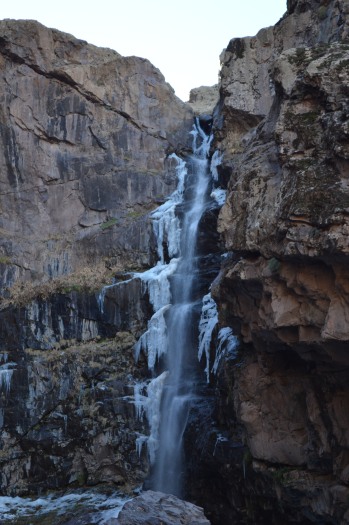 The group ventured off on a side trip to the Tamsoulte waterfalls (2,700m), while Maggie and I rested with some of the mules and a herd of goats at Tizi Mzik (2,489m). I forced a piece of the tasteless Moroccan bread down my throat into a completely vacant stomach.
The group ventured off on a side trip to the Tamsoulte waterfalls (2,700m), while Maggie and I rested with some of the mules and a herd of goats at Tizi Mzik (2,489m). I forced a piece of the tasteless Moroccan bread down my throat into a completely vacant stomach.
We were retrieved and continued, my feet still moving, head down, maybe with too much self pity. Then a long uphill, and I mounted and just couldn’t remove myself from the mule, except for certain reasons I would rather not mention.
Finally, we hit the peak, and I was able to stumble down a few kilometers on foot (cry me a river, right?). While our crew feasted on a gourmet picnic lunch, I never even saw it and slept peacefully a few feet away.
Post-lunch (nap), we made our way to the Imlil Valley (1,800 meters), arriving at last at Dar Assarou (lodging), after more than 25 kilometers and 6,000 feet of elevation gain over two days, be it on or off the mule. As soon as we checked in, I enjoyed a shower in our very own bathroom, and went down for the count, apparently missing “the best tagine yet.”
Now that I have focused on my own torture, I should at least remind all of the magnificence of the High Atlas Mountains, the sounds of the prayer calls from the mosques in each village, the friendly Berbers, our good luck with splendid weather, and the strong work by all of the children!
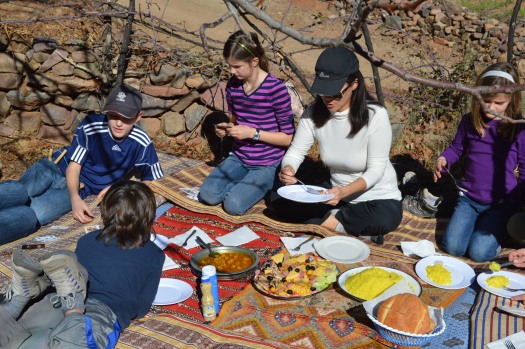
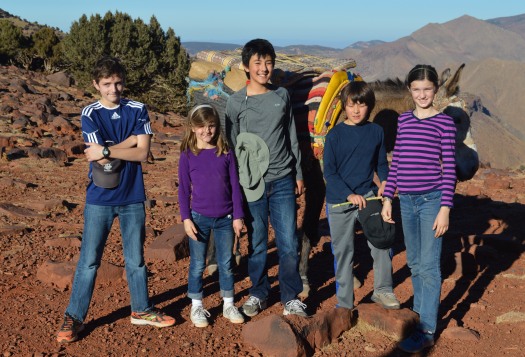
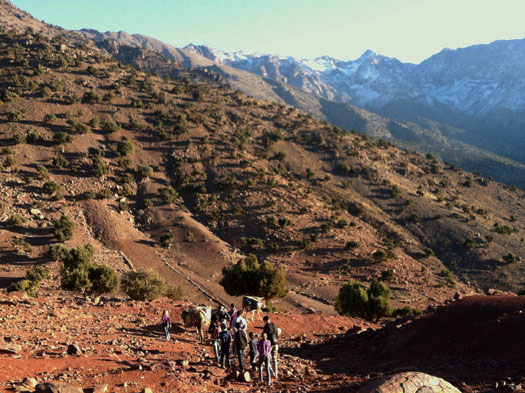
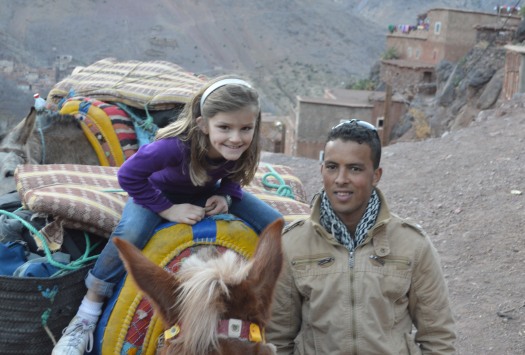
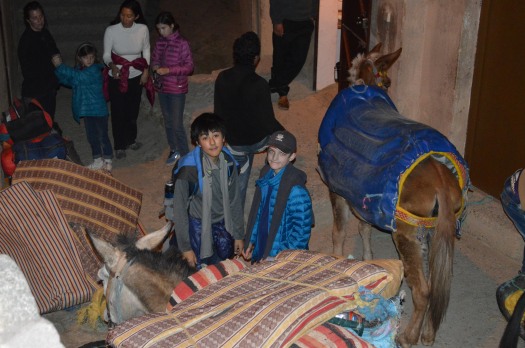
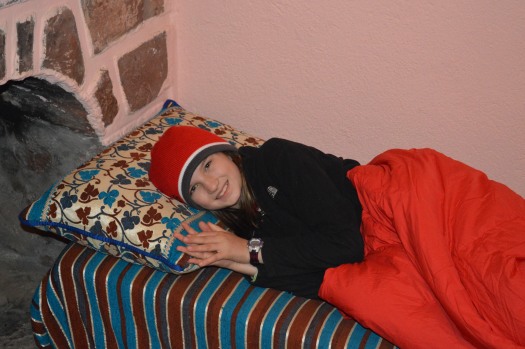
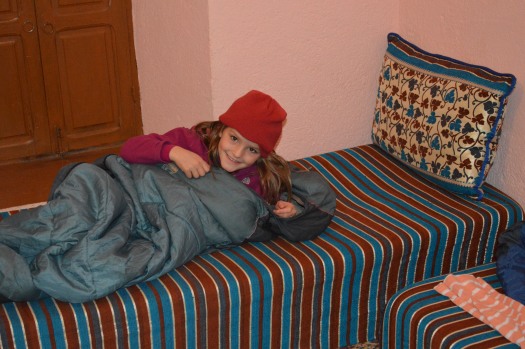
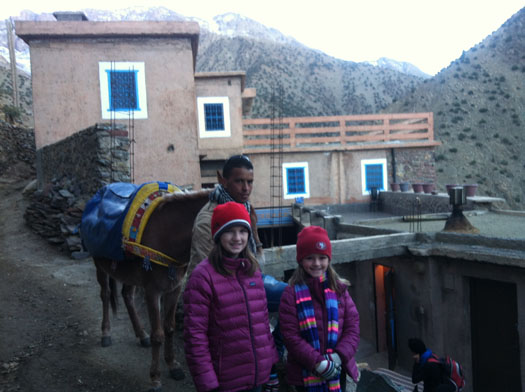
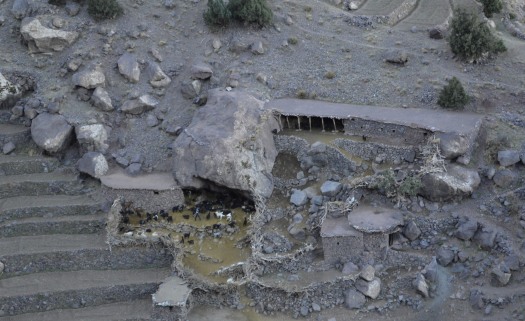
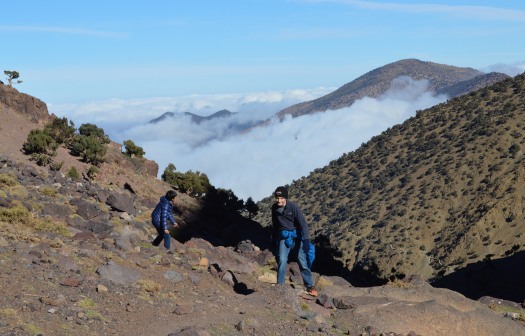
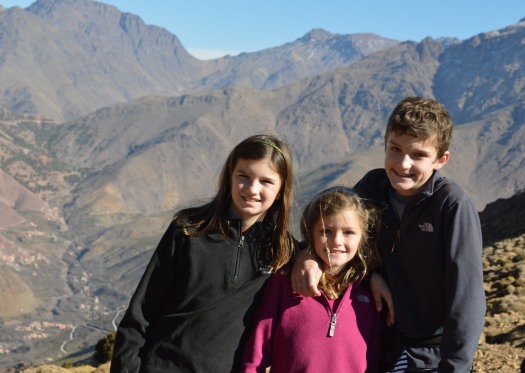

Will, so sorry you suffered, but you write about it beautifully! Thank you for this wonderful writing about your amazing trip(s)!
love,
polly
Polly–thank you for the kind words; I really appreciate it. We are certainly having a lot of fun on our adventures and I feel very lucky to be able to do this.
Love,
Will